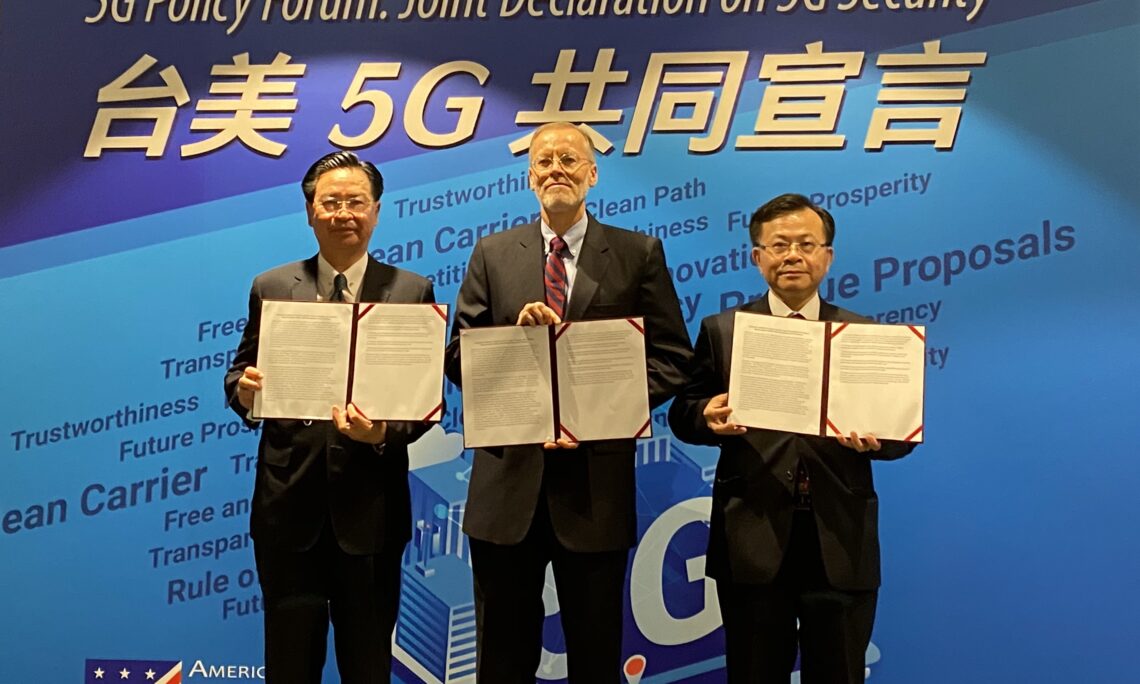PR-2034
August 26, 2020
American Institute in Taiwan and the Taipei Economic and Cultural Representative Office Joint Declaration on 5G Security
Taking into account that secure fifth generation wireless communications networks (5G) will be vital to both future prosperity and security, the American Institute in Taiwan (AIT) and the Taipei Economic and Cultural Representative Office, on behalf of their respective authorities, note the importance of cooperation on 5G. 5G will enable a vast array of new applications, including the provision of critical services to the public, which will benefit our economies. Increased amounts of data on 5G networks will further interconnect the economies of the world, including the United States and Taiwan, and facilitate cross-border services and commerce. Protecting these next generation communications networks from disruption or manipulation as well as the privacy and individual liberties are vital to ensuring our economies are able to take advantage of the tremendous economic opportunities 5G will enable.
Therefore, we recognize the Chairman’s statement from the Prague 5G Security Conference—the “Prague Proposals” —as an important step toward developing a common approach to 5G network security, and ensuring a secure, resilient, and trustworthy 5G ecosystem. The Prague Proposals emphasize the need to develop, deploy, and commercialize 5G networks based on the foundation of free and fair competition, transparency, and the rule of law.
We emphasize the importance of encouraging the participation of reliable and trusted network hardware and software suppliers in 5G markets, taking into account risk profile assessments, and promoting frameworks that effectively protect 5G networks from unauthorized access or interference. We further recognize that 5G suppliers should provide products and services that enable innovation and promote efficiency. These products and services should also enable fair competition and encourage downstream development by the maximum number of market participants. We believe that all stakeholders have a shared responsibility to undertake a careful, balanced evaluation of 5G hardware and software suppliers and supply chains to promote a secure and resilient 5G architecture. Towards this end, the United States and Taiwan are working closely to help raise awareness globally about the risks to 5G networks through the Global Cooperation and Training Framework, and look forward to continuing to work with like-minded partners to develop appropriate 5G standards, guidelines, and best practices.
To promote a vibrant and robust 5G ecosystem, a rigorous evaluation of suppliers should take into account the rule of law; the security environment; ethical supplier practices; and a supplier’s compliance with secure standards and industry best practices. Specifically, evaluations should include the following elements:
1) Whether network hardware and software suppliers are subject, without independent judicial review, to control by a foreign government;
2) Whether network hardware and software suppliers are financed openly and transparently using standard best practices in procurement, investment, and contracting;
3) Whether network hardware and software suppliers have transparent ownership, partnerships, and corporate governance structures; and
4) Whether network hardware and software suppliers exemplify a commitment to innovation and respect for intellectual property rights.
We believe that it is critical to transition from untrusted network hardware and software suppliers in existing networks to trusted ones through regular lifecycle replacements. Such efforts will not only improve our respective security, but also provide opportunities for private sector innovators to succeed under free and fair competition and benefit our respective digital economies.
















![Video Thumbnail [Recovered]-01](../wp-content/uploads/sites/269/Video-Thumbnail-Recovered-01-1-750x450.jpg)




